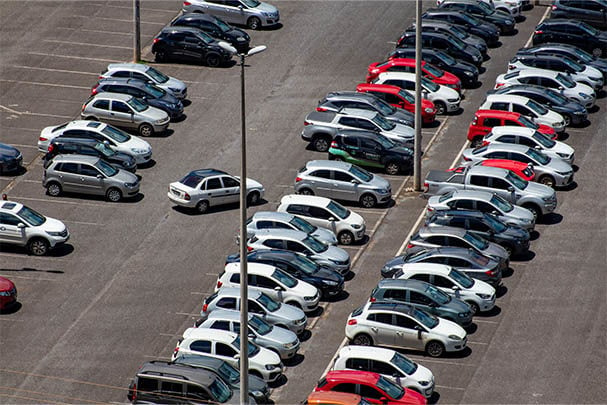
Nationwide Vehicle Contracts explore ways transportation can contribute to stress and anxiety when searching for a parking spot and provide tips on making the process less frustrating.
Driving in busy areas of UK cities can be stressful enough, but finding a parking spot can make it even more frustrating. It’s no secret that looking for a place to park can cause anxiety and stress, especially when you’re running late for a meeting or appointment. However, with the help of technology and some common-sense tips, finding a parking spot can become less of a hassle. In this post, we will explore ways in which cars and transportation can contribute to stress and anxiety when searching for a parking spot, and provide tips on how to make the process less frustrating.
The problem of parking in busy areas of UK cities
Parking has always been a problem in UK cities. With the rise in population and the number of cars on the road, finding a parking spot has become more difficult. According to the British Parking Association, the average driver in the UK spends nearly four days every year (91 hours) searching for a parking spot. Moreover, a study conducted by the National Car Parks in 2019 found that over 30% of drivers felt stressed while looking for a parking spot, and 25% felt angry.
Time-Saving Tips for Finding a Parking Spot
Use Parking Apps: One of the easiest ways to find a parking spot is to use parking apps that can help you locate available spots nearby. There are many different apps available, including ParkMe, Parkopedia, and JustPark, all of which can help you find the nearest available parking spot, compare prices and reserve a space in advance. Many of these apps also offer additional features, such as real-time availability and pricing information, and the ability to pay for parking using your phone.
Check Nearby Car Parks: Another option is to check nearby car parks. While these may be more expensive than street parking, they can be a great option if you're short on time or need to park for an extended period. Many car parks now offer pre-booking services that can help you save time and money.
Use Public Transportation Instead of Driving: If you're visiting a busy city centre, consider using public transportation instead of driving. This can save you the hassle of finding a parking spot altogether, and many cities now offer excellent public transportation options that are both convenient and affordable.
Park Further Away and Walk: If you're willing to walk a little further, consider parking further away from your destination. This can often mean fewer crowds and a greater chance of finding a parking spot.
Avoid Peak Parking Hours: Finally, try to avoid peak parking hours. This may mean adjusting your schedule slightly, but it can help you avoid the frustration of circling around busy streets and car parks in search of a spot. Peak parking hours tend to be during the morning and evening rush hours, so consider timing your trip accordingly.
Safety Tips to Keep in Mind While Finding a Parking Spot
While finding a parking spot can be a hassle, it's important to keep safety in mind. Here are some key tips to help you stay safe while searching for a spot:
Be Aware of Your Surroundings: Always be aware of your surroundings, particularly if you're parking in an unfamiliar area. Keep an eye out for any suspicious activity, and try to park in well-lit areas if possible.
Lock Your Car Properly: Always make sure your car is locked properly before leaving it unattended. This may seem obvious, but it's easy to forget in the rush to find a parking spot.
Don't Leave Valuables in Your Car: Avoid leaving any valuables in your car, particularly if they're visible from the outside. This can make your car a target for thieves and can lead to a lot of frustration and anxiety.
Tips for Parking Etiquette
Finally, it's important to keep basic parking etiquette in mind. Here are some key tips to help you be a considerate driver and avoid causing frustration for other drivers:
Follow parking rules and signs: Make sure you park in designated areas and follow any parking rules or regulations. This includes paying for parking where required, parking within the lines of your designated spot, and obeying any time restrictions.
Be considerate of other drivers: Don't park too close to other cars, especially if it makes it difficult for them to get in or out of their vehicle. Avoid taking up multiple parking spots, and be mindful of the space you are taking up. If you have a larger vehicle, try to park away from smaller cars to avoid causing any damage.
Avoid double-parking: Double-parking can cause traffic congestion and make it difficult for other drivers to navigate the area. If you need to stop briefly, try to find a legal parking spot or pull over to the side of the road to allow traffic to flow smoothly.
Use turn signals: When pulling into a parking spot, use your turn signals to indicate your intention to other drivers. This can help prevent accidents and make it easier for others to anticipate your movements.
Don't block other vehicles: Make sure your vehicle is not blocking any other vehicles, driveways, or entrances. This includes being mindful of fire hydrants and emergency zones, which should always be kept clear.
Future of parking and technology innovations
The future of parking is likely to involve greater use of technology and innovations that make finding parking easier and more efficient. These advancements can help reduce traffic congestion, improve parking availability, and make the overall parking experience more convenient for drivers. Here are some examples:
Smart parking systems: These are systems that use sensors and cameras to detect available parking spaces and direct drivers to them. Some systems even allow drivers to reserve a parking spot in advance.
Mobile apps: Mobile apps like ParkMe, ParkWhiz, and SpotHero can help drivers find available parking spots and even provide real-time information on parking availability and rates.
Connected vehicles: Connected vehicles can communicate with parking infrastructure to provide drivers with information on available parking spaces and even reserve parking spots in advance.
Autonomous vehicles: Autonomous vehicles can drop off passengers and then park themselves in designated areas. This can help reduce traffic congestion and the time and effort required to find parking.
Parking garages with automated valet systems: These systems use robotics and artificial intelligence to park vehicles in a garage without the need for a human valet. This can help reduce the time and hassle of parking for drivers.
For more information about parking, why not check out our The Laws of Parking guide? We also produce a range of weekly blogs on various topics, which can be found in the blog section of our website.
Nationwide Vehicle Contracts are one of the UK's leading car leasing brokers and offer a range of leasing deals to suit every need. To find out more, check out our comprehensive car leasing guides or call one of our experts on 0345 811 9595.

